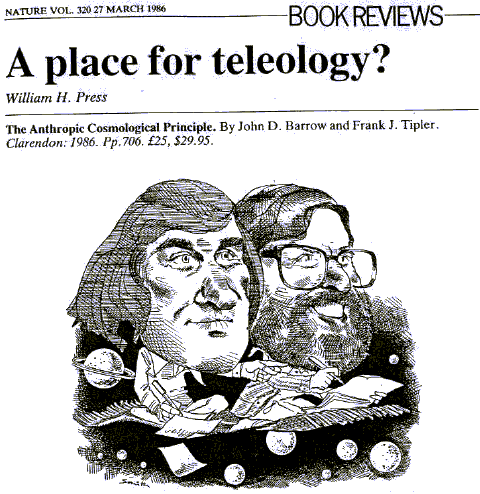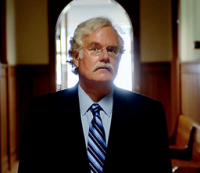The Physics of Christianity
Synopsis: Frank Tipler takes an exciting new approach to the age-old dispute about the relationship between science and religion in The Physics of Christianity. In reviewing centuries of writings and discussions, Tipler realized that in all the debate about science versus religion, there was no serious scientific research into central Christian claims and beliefs. So Tipler embarked on just such a scientific inquiry. The Physics of Christianity present the fascinating results of his pioneering study.
Tipler begins by outlining the basic concepts of physics for the lay reader and brings to light the underlying connections between physics and theology. In a compelling example, he illustrates how the God depicted by the Jews and Christians is completely consistent with the Cosmological Singularity, an entity whose existence is required by physics. His discussion of the scientific possibility of miracles provides an impressive, credible scientific foundation for many of Christianity's most astonishing claims, including the Virgin Birth, the Resurrection, and the Incarnation. He even includes specific outlines for practical experiments that can help prove the validity of the "miracles" at the heart of Christianity.
Tipler's thoroughly rational approach and fully accessible style sets The Physics of Christianity apart from other books dealing with conflicts between science and religion. It will appeal not only to Christian readers but also to anyone interested in an issue that triggers heated and divisive intellectual and cultural debates.
PLEASE READ: THE BEST REVIEW OF THE PHYSICS OF CHRISTIANITY
The Physics of Immortality
Reviews:
Inspired by Frank Tipler's book, the noble prize winner for literature in 1980 Czeslaw Milosz, wrote a poem entitled "After Enduring"
>>>found here in pdf format<<<
"... I believe that the omega-point theory deserves to become the prevailing theory of the future of spacetime ..."
physicist David Deutsch, Oxford University, on page 355 of his book The Fabric of Reality (Penguin 1997)
"... Let me just say that I think big pieces of Frank's argument are brilliant and beautifully done. But it is in the leaky joints between the pieces where I think the problems lie with Frank's theory. ..."
Kip S. Thorne, Feynman Professor of Physics at Cal Tech, in Skeptic 3 (1995), page 67.
"Besides being fascinating in its bold proclamations, this is, in fact, a very weighty book, filled with complex ideas and sophisticated results. ... Tipler has written a masterpiece for the Age of Aquarius, conferring much-craved scientific respectability on what we have always wanted to believe in. ..."
Science, 17 February 1995 (vol 267, page 1042)
"... The Physics of Immortality is, in short, an utterly extraordinary piece of work. Setting out to be a popular book, and largely succeeding thanks to its vigorous English, it still manages to be one which only a very few will understand at all completely. ... As for me, I found it fascinating."
Philosopher John Leslie, writing in London Review of Books 23 March 1995, page 8.
"Perhaps Tipler's most important contribution [in Physics of Immortality] is his insistence that the world as described by physics is more open to interaction with biblical and theological perspectives than is often believed."
Theologian Wolfhart Pannenberg, writing in Zygon, vol. 30, June 1995 page 309.
Synopsis: Is there a higher power in the universe? What happens to us when we die? Leading physicist Frank J. Tipler tackles these questions and more in an astonishing and profoundly important book that scientifically proves the existence of God and the physical resurrection of the dead
The Anthropic Cosmological Principle
Reviews:
"... a remarkable book and a masterly exposition of what seems bound to become one of the most important developments to have taken place in physical science. ... after this account fundamental physics can never be the same again. ... I would urge every scientist concerned about the significance of his own pursuits to read and ponder upon the insights of this book."
Sir Willam McCrea, FRS, Times Literary Supplement (1/2/87)
"...fascinating ... a tour de force. ... I highly recommend it to anyone with a serious interest in science or in questions relating to the universe and our existence."
Sky & Telescope (2/87)
"...a feast: the kind of volume which tells you everything you want to know about everything ... a... book... on nothing less than man's place in the universe."
The Economist (1/2/87)
"... a work that should be ... in the hands of anyone who would see the state of late 20th century cosmology and where it is heading. ... Barrow and Tipler have made a 'classic' contribution to cosmology both in terms of their creative thinking and in their elaboration of the scope of the field."
Journal of the American Scientific Affiliation(12/86)
"... a remarkable book..."
Daily Telegraph (9/1/86)
"... [an] impressive work on the philosophical issues of modern cosmology. ...The Anthropic Cosmological Principle is a comprehensive work that does justice to a fascinating subject."
American Scientist(1/87)
"... the appearance of a work of such depth and breath of thought is ... an exceedingly rare occurrence. ... seven hundred pages of concentrated reasoning based on extraordinary erudition... Such is the scope they achieve, I am driven to think they must be the only people in the Galaxy qualified to review their own book."
Sir Willam McCrea, FRS, Times Literary Supplement (1/2/87)
"Is the Universe made for mankind? ... [Barrow and Tipler's] discussion is on as heroic a scale as the idea itself. ... [this reviewer] found this book extremely stimulating and interesting. ... it will be as widely read as it deserves to be."
New Scientist (5/1/86)
"... a marvelous treasure trove... a joy to all cosmologists and would-be cosmologists ... Much of the book is original ... And it is a great bargain."
Science (5/23/86)
"... The general public will soon hear of this book as the answer to the futility of speculations about extraterrestrial civilizations."
S.L. Jaki, Reflections (Fall, 1986)
"... this is a remarkable book. Nobody truly interested in philosophical aspects of cosmology can dispense with reading it. ... this book marks a new step along our way of addressing questions to the Universe."
Classical and Quantum Gravity (3,727 (1986)
"... scholarly, philosophically sophisticated ... an engaging book, practically a universal education in the history of modern science and the history of the Universe. This book will be much quoted, much debated, and much praised. It deserves a place on the shelf of any serious scholar of science."
Nature (3/27/86)
"... a clear, exhaustively researched book ... Mr. Barrow and Mr. Tipler obviously have done an enormous amount of research ... it is a book that impels the reader to think, and it may alter the terms of discourse within which it will be judged."
New York Times Book Review (2/16/86)
"... should provoke lively debate among intelligent creatures for years to come."
The Sciences (9/86)
"..well-written, painstakingly researched, fascinating, exasperating.."
Martin Gardner, New York Review of Books (5/8/86)
"... written with great eloquence and zest ... a piece of natural philosophy in the old-fashioned sense ... only readers who are such impressive polymaths as the authors will really and fully appreciate the whole lot ... but ... I believe that any reader, whatever his background, is going to find parts of this book fascinating provided that the reader has ever wondered about the world and why we come to be in it."
Martin Rees, FRS, former Plumian Professor of Astronomy at Cambridge University, now Royal Society Professor of Astronomy at Cambridge and Astronomer Royal, on BBC program SCIENCE NOW (4/7/86)
"... the present book ... has no competitor in completeness and modernity..."
Choice (7/86)
"... a tour de force..."
The Boston Globe
"... scholarly and thorough... [the book] is not intended to settle a debate [on] ... the role we, as conscious purposive individuals, have to play in the great scheme of things ... but to stiffen it with some hard science. In this it has succeeded admirably."
P.C.W. Davies, Times Higher Education Supple- ment (3/21/86)
"... a controversial new book ... will inspire discussion and debate, as we again think through the place of science, history, philosophy, and man in the universe."
The Christian Science Monitor (7/3/86)
"... The Anthropic Cosmological Principle is a tour de force of contemporary scientific writing. This is a scholarly work and a major source book for all who are interested in man's relation to the cosmos."
Sir Bernard Lovell, FRS The Good Book Guide: Annual Selection for 1987 (2/87)
"... fascinating and entertaining ... a major contribution to scientific and philosophical debate, and a delight to dip into."
The Good Book Guide: Annual Selection for 1987 (2/87)
"An extraordinary, interesting book which will cause a great deal of revised thinking in virtually every area of cerebration. ..."
Ashley Montagu
"... a tour de force..."
Robert Jastrow
"... [Barrow and Tipler] ... did their homework on philosophy and theology thoroughly..."
Ian Barbour, Dallas Morning News (2/23/87)
"... the most wanted book on the A shelf " of the British Library Document Supply Centre,the world's largest reference library."
The Guardian (9/18/86)

Synopsis: Is there any connection between the vastness of the universes of stars and galaxies and the existence of life on a small planet out in the suburbs of the Milky Way? This book shows that there is. In their classic work, John Barrow and Frank Tipler examine the question of Mankind's place in the Universe, taking the reader on a tour of many scientific disciplines and offering fascinating insights into issues such as the nature of life, the serach for extraterrestrial intelligence, and the past history and fate of our universe.
